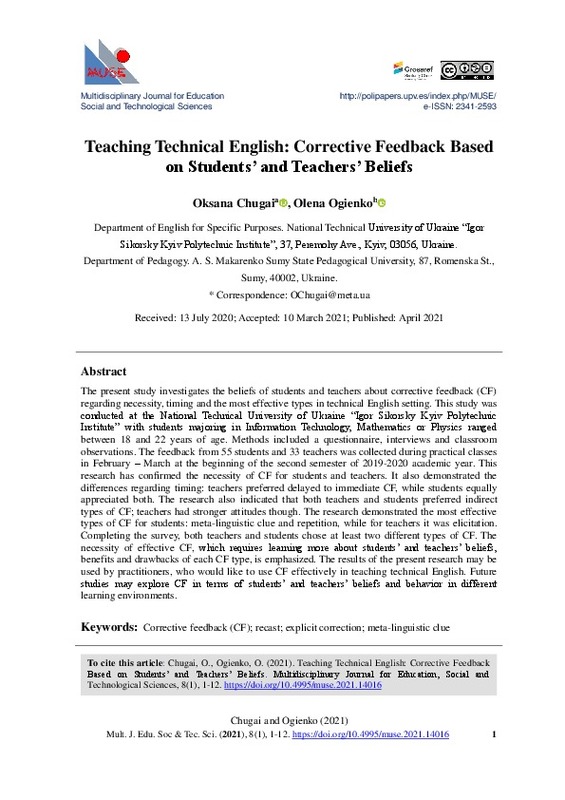Basturkmen H. (2012). Review of research into the correspondence between language teachers' stated beliefs and practices. System, 40(2), 282-295. https://doi.org/10.1016/j.system.2012.05.001
Brown, A. (2009). Students' and teachers' perceptions of effective foreign language teaching: A comparison of ideals. The Modern Language Journal, 93(1), 46-60. https://doi.org/10.1111/j.1540-4781.2009.00827.x
Chugai, O. (2020). Providing Effective Corrective Feedback in ESP Class. Proceedings of the II Annual Conference on Current Foreign Languages Teaching Issues in Higher Education, 90-91. https://kamts2.kpi.ua/sites/default/files/img/i%D1%80%D0%BD%D0%B8%D0%BA%2014.05.2020%281%29.pdf
[+]
Basturkmen H. (2012). Review of research into the correspondence between language teachers' stated beliefs and practices. System, 40(2), 282-295. https://doi.org/10.1016/j.system.2012.05.001
Brown, A. (2009). Students' and teachers' perceptions of effective foreign language teaching: A comparison of ideals. The Modern Language Journal, 93(1), 46-60. https://doi.org/10.1111/j.1540-4781.2009.00827.x
Chugai, O. (2020). Providing Effective Corrective Feedback in ESP Class. Proceedings of the II Annual Conference on Current Foreign Languages Teaching Issues in Higher Education, 90-91. https://kamts2.kpi.ua/sites/default/files/img/i%D1%80%D0%BD%D0%B8%D0%BA%2014.05.2020%281%29.pdf
Chugai, O., Terenko, O., & Ogienko, O. (2017). Methods that work: best practices of adult educators in the USA. Advanced Education, 8, 72-77. https://doi.org/10.20535/2410-8286.109216
Dornyei, Z., Ryan, S. (2015). The Psychology of the Language Learner Revisited. Routledge. https://doi.org/10.4324/9781315779553
Ellis, R. (2009). Corrective Feedback and Teacher Development. L2 Journal, 1(1), 3-18. https://repositories.cdlib.org/uccllt/l2/vol1/iss1/art2/ - https://doi.org/10.5070/L2.V1I1.9054
Ellis, R. (2010). Cognitive, social, and psychological dimensions of corrective feedback. In R. Batstone (ed.), Sociocognitive Perspectives on Language Use and Language Learning (pp. 151-165). Oxford: Oxford University Press.
Horwitz, E.K. (1990). Attending to the affective domain in the foreign language classroom. In S.Magnan (Ed.), Shifting the instructional focus to the learners (pp. 15-33). Middlebury, VT: Northeast Conference on the Teaching of Foreign Languages.
Horwitz, E.K. (2015). Beliefs about language learning and the experience of second language learning: Asking useful questions about language learning. In H.M. McGarrell and D.Wood (Eds.), CONTACT-Refereed Proceedings of TESL Ontario Research Symposium, 41(2), (pp. 20-30).
Kartchava, E. (2016). Learners' beliefs about corrective feedback in the language classroom: perspectives from two international contexts. TESL Canada Journal 33(2), 19-45. https://doi.org/10.18806/tesl.v33i2.1235
Lantolf, J. (2000). Sociocultural Theory and Second Language Learning. Oxford University Press.
Li, S. (2013). Oral corrective feedback. ELT Journal, 68(2), 196-198. https://doi.org/10.1093/elt/cct076
Li, S. (2018). Corrective Feedback in L2 Speech Production. The TESOL Encyclopedia of English Language Teaching, (1st ed.). https://doi.org/10.1002/9781118784235.eelt0247
Li, S., Zhu, Y., & Ellis, R. (2016). The effects of the timing of corrective feedback on the acquisition of a new linguistic structure. Modern Language Journal, 100, 276-295. https://doi.org/10.1111/modl.12315
Loewen, S., Li, S., Fei, F., Thompson, A., Nakatsukasa, K., Ahn, S., & Chen, X. (2009). Second language learners' beliefs about grammar instruction and error correction. The Modern Language Journal, 93, 91-104. https://doi.org/10.1111/j.1540-4781.2009.00830.x
Lytovchenko, I., Lavrysh, Y., Lukianenko, V., & O. Ogienko, O. (2020). How to Teach Grammar to Adult ESP Learners at Technical University More Communicatively: Task-Based Approach. Multidisciplinary Journal for Education, Social and Technological Sciences, 7(1), 54-71. https://doi.org/10.4995/muse.2020.12419
Lytovchenko, I., Ogienko, O., Sbruieva, A., & Sotska, H. (2018). Teaching English for specific purposes to adult learners at university: methods that work. Advanced Education, 10, 69-75. https://doi.org/10.20535/2410-8286.149741
Mori, R. (2002). Teachers' Beliefs and Corrective Feedback. JALT Journal, 24(1), 48-69. https://doi.org/10.37546/JALTJJ24.1-3
Russel, V. (2009). Corrective feedback, over a decade of research since Lyster & Ranta (1997): Where do we stand today? Electronic Journal of Foreign Language Teaching, 6(1), 21-31. https://e-flt.nus.edu.sg/archive/v6n12009.html
Schulz, R. A. (2001). Cultural differences in student and teacher perceptions concerning the role of grammar instruction and corrective feedback: USA - Columbia. The Modern Language Journal, 85(2), 244-258. https://doi.org/10.1111/0026-7902.00107
Scrivener, J. (2005). Learning teaching, a guide for guidebook for English language teachers. 2nd ed. Macmillan Education.
Yoshida, R. (2008). Teachers' choice and learners' preference for corrective-feedback types. Language Awareness, 17(1), 78-93. https://doi.org/10.2167/la429.0
Zhang, L. J., Rahimi, M. (2014). EFL learners' anxiety level and their beliefs about corrective feedback in oral communication classes. System, 42, 429-439. https://doi.org/10.1016/j.system.2014.01.012
[-]









